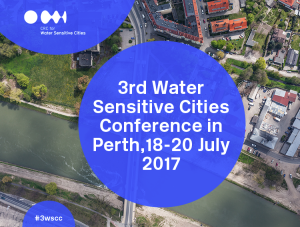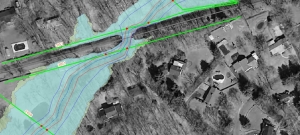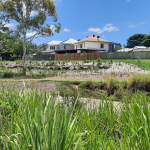Upcoming Events
Sponsored by;
Time: 8.30am for a 9.00am start (concluding with lunch from 12.30pm)
As part of any development approval, local governments request developers to meet stringent stormwater quality requirements before allowing stormwater to discharge to local receiving waterways or adjoining public stormwater infrastructure. For over a decade now, these requirements have been met by use of various types of proprietary and non-proprietary stormwater treatment devices or systems, including Gross Pollutant Traps, Oil and Silt Arresters, Sediment Fore-Bays, Trash Racks, Litter Baskets, Sediment Ponds, Swales and Bio-Retention Systems, etc. All of these systems need maintenance in order to consistently meet the quality requirements of their design. When reflecting on our efforts in stormwater quality improvement over the last decade, a number of important questions arise, including:
- Are these systems, both public and privately owned, being maintained according to manufacturer specifications and/or design guidelines?
- Who is responsible for maintaining these systems? How is local government responsible for publicly owned assets? What obligations do private asset owners have to maintain these assets?
- What regulatory or incentive frameworks are currently in place to ensure these assets are maintained? What regulatory or incentive frameworks could be considered in the future?
- How does local government keep a track of these assets? Do they know where they are located? How much data or information do they have?
- How do they use this data or information? How do they store it? Who is responsible for it?
- To what extent are systems owned by private entities, other than local governments, being maintained?
Stormwater Queensland is hosting a forum to assist in understanding the management situation for public and privately owned systems and to find answers to the above. The event is recommended for those involved in urban stormwater planning, policy or development, asset management and maintenance. An expert panel from a broad cross section of the industry is being convened for this event to provide different perspectives on this topic.
An expert panel from a broad cross section of the industry has been convened for this event to provide different perspectives on this topic including;
- Claire McAsh – Senior Environmental Engineer, City of Gold Coast
- Russell Cadman – WSUD Compliance Officer, Blacktown City Council, NSW
- Aaron Marmara – Operations Supervisor, Cleanaway
- Mark Bibby – General Manager, Regen Australia
- Jack Mullaly – Crazed Founder, Ideanthro
There are some fantastic examples from the UK and other parts of the world that use a naturalistic approach to floodplain management. The question is, however, can these types of techniques be practically applied in SEQ? Given that the local climate and other components are vastly different to these areas, will these approaches be feasible and if so to what degree and how would they be best used?
Recent discussions within some organisations have pinned hopes on naturalistic floodplain management as “the answer” to several common issues, which makes it well worth considering. However, there are unresolved issues regarding the importance of revegetation weighed against the potential for increased flood levels upstream (and potential decreased flood levels downstream) also the quantification measurement and modelling of such approaches, climate, storage, practicality as well as the cost of implementation.
Key items that will be discussed include:
- Applying Natural Floodplain Management Techniques in Queensland. What is the likelihood for success?
- Lessons learned from the UK on Natural Floodplain Management. Application of natural techniques should as floodplain reengagement, revegetation, infiltration and temporary storage through leaky weirs etc.
- Discussion surrounding the future Bremer River Catchment Study and the opportunities for integrated water approaches
- Application of revegetation etc in Bremer/Lockyer systems and possible implications for the regional area.
- The power of using flood mitigation as a mechanism to get other benefits (water quality, bank stabilisation, more trees in the ground)
- Hurdles such as property resumptions, increasing flooding upstream whilst benefiting downstream property, lack of legislation power to enable greater community good and working with landowners on useable land.
- Previous case studies and a quick look at what Ipswich is looking at for a natural floodplain management pilot project
Stormwater Queensland is hosting a lunchtime presentation to facilitate a transfer of ideas and assist in understanding a natural floodplain management approach.
Phil Smith (Waterways Health Officer) and Adam Berry (Floodplain Management Engineer) from Ipswich City Council will be co-presenting and will provide time at the end for discussion/questions and answers.
Winter School
sponsored by;
Date: 9, 10 and 11 August 2017
Time: 8.30am – 5.00pm each day
Venue: GHD, Level 8, 145 Ann Street, Brisbane
Price: $450 (p/workshop, p/day) SQ members; $550 (p/workshop, p/day) non-members
Space is Limited! Register today
Every year, Stormwater Queensland is proud to hold its annual “Winter School”. What is Winter School you might ask? Well, for those of you who have attended previously, the Winter School is a fantastic chance for all to brush-up on their stormwater management skills and possibly learn a thing or two, including updates on new or revised industry methods and applications. You get to learn one-on-one with industry experts and network with others in various stormwater management disciplines at the same time.
This year we are holding three full-days of workshops. These workshops are:
● DAY 1 – HEC-RAS 2D
This one day workshop is designed for those looking to make their first step into the 2D modeling world, along with seasoned professionals looking for a refresh on up to date modern techniques.
Key aspects covered by the course:
- Introduction to HecRas
- Key input parameters for 2D modeling
- Modeling of real life case studies
This course will be run by Krey Price. Krey is a civil engineer and project manager with international experience in water resources. He is engaged with computational modeling, engineering design, and project management for flood mitigation, mine rehabilitation, river and wetland restoration, Stormwater management and catchment assessment projects.
● DAY 2 – ARR Workshop – Neil Collins and Martin Giles
This one day workshop is set to cover off on one of the biggest changes to the Stormwater Industry in 30 years – ARR 2016.
Key points that will be covered in this one day workshop.
Overview of ARR16
- Key changes 87 vs. 16
- How to put together a Stormwater design or flood study using ARR16 (key emphasis on the new temporal patterns and ensemble storms)
- Key focus on Chapter 9: Urban Development
This course will be run by Martin Giles. Martin has 28 years’ experience, specializing in hydraulic and environmental investigations. Modeling work undertaken by Martin has included complex floodplain systems and the application of dynamic modeling to urban Stormwater design.
● DAY 3 – Stream Management – Misko Ivezich
This one day workshop will take you down the journey of stream management (fluvial geomorphology). This course will give designers the information and experience required to make informed design decisions that will result in a positive environmental outcome
The key concepts covered by this course:
- Fundamentals of Fluvial Geomorphology (including case studies)
- Fundamentals on waterway management
- Real life case study discussion
This course will be run by Misko Ivezich. Misko is an environmental engineer with core interests and skills in the complex interactions between hydrology, hydraulics and fluvial geomorphology. Misko has strong geomorphic field assessment skills having inspected hundreds of waterways across eastern Australia.
Thanks to our host and sponsor we have been able to reduce the cost so to ensure you receive a valuable and rewarding participation.
Costs per workshop, per day are:
● $450 SQ Members (inc GST)
● $550 Non-Members (inc GST)
Discounts Apply
Book 2 days – $50 off first day
Book 3 days – $100 off first day

Effective land and water management requires a holistic approach across catchments and the development cycle. But it also throws up challenges – grey areas – that require new or different ways of thinking.
For that reason, Stormwater Queensland (SQ) and the International Erosion Control Association (IECA) Australasia have come together for a joint conference in 2017 to recognise the common values and purpose they share in effective land, stormwater and waterway management:
All soil and water professionals are invited to join us in beautiful Brisbane in October 2017. The conference will bring together practitioners, academics, suppliers, asset owners and students in a common forum to engage, collaborate, discuss and dive headfirst into the grey areas of land and water management.
With so many established concepts and approaches for land and water management, this conference will explore the grey areas, the subtleties that exist within those approaches that can trip us up or mean the difference between success and failure. We’ll look at emerging technologies, established approaches, and will never discount embracing the old ways; what can we learn from past mistakes and how can we work smarter to manage our land and water resources?
This conference aims to celebrate our successes, explore new challenges, encourage better integration of soil and water management, and promote engineering and science as complimentary disciplines.
This conference effectively unites two organisations that are in the business of managing stormwater quality and quantity at various stages of development, from design to construction and on to operation.
The conference will include keynote speakers, plenary sessions, open discussion forums, panel sessions, technical workshops, exhibitions and a comprehensive social program.
With SQ and IECA coming together for this conference, it is sure to be a fun, vibrant, thought-provoking event that will expand delegates’ thinking and knowledge while challenging them to investigate the nuanced grey areas of land and water management.
We look forward to seeing you in Brisbane in October 2017!
Avoid disappointment and register today HERE












